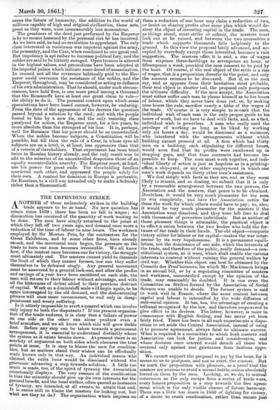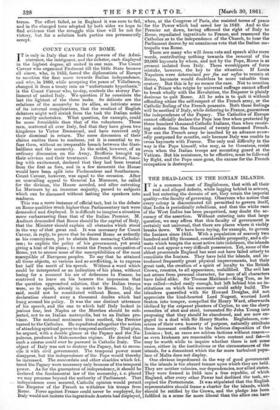THE IMPENDING STRTKE.
ANOTHER of these melancholy strikes in the building trade appears to be at hand. No new question has arisen since 1859; there has been no fall in wages ; no diminution has occurred of the quantity of work waiting to be done. The men have simply returned to the point at which they left off two years ago, and demand once more a reduction of the time of labour to nine hours. The workmen employed by Sir Morton Pete, by the contractors for the Great Exhibition, and by some other firms, have already struck, and the movement once begun, the pressure on the trade to tarn out soon becomes irresistible. We all know how, if the contest once becomes one for victory, the struggle must ultimately end. The masters cannot yield to demands the limit of which they cannot foresee' nor can they suffer themselves to be defeated singly. Any general movement must be answered by a general lock-out, and after the profits and savings of a year have been sacrificed on each side, the men will return to their labour without advantage, and with all the bitterness of defeat added to their previous distrust of capital. Work on a diminish& scale will begin again, to be again interrupted by the old demand, and the disheartening process will once more recommence, to end only in disap- pointment and weary suffering. Is it utterly impossible to avert a quarrel whieh can involve only injury to both the disputants ? If the present organiza- tion of the trade endures, it is clear that a failure of power on one aide or the other can alone produce even a brief armistice, and we all know which side will grow feeble first. Before any step can be taken towards a permanent arrangement, it is essential to understand distinctly where the system as it exists breaks down. At present there is an acerbity of argument on both sides which obscures the true points at issue, It is easy to blame the men for combine- tion, but as matters stand their wishes can be effectually made known only in that way. Au individual mason who claimed the extra hour would be dismissed without the grievance advancing a step towards solution.. A little too much is made, too, of the spirit of tyranny the Association occasionally displays. The very essence of the combination is that the minority should give up its own interests for the general benefit, and the local strikes, often quoted as instances of tyranny, are intended, at all events, to attain that end. It is easier still to blame the masters for locking out but what are they to do? The organization which imposes on them a reduction of one hour may claim a reduction of two, or insist on sharing profits after some plan which would de- stroy the object of investing capital in the trade. The men, as things stand, must strike or submit, the masters must lock out or be ruined, and between' the two necessities a trade which supports thousands falls helplessly to the ground. In this view the proposal lately advanced, and ac- cepted by everybody except those interested, becomes a vain suggestion. The masters offer, it is said, a rise of wages from sixpence three-farthings to sevenpence an hour, or fifteenpence a week, provided the men consent to be paid by the hour. Of course, if the real object of the strife is a rise of wages, that is a proposition directly to the point, and only the amount remains to be discussed. But if, as the men say, and as appears from their hesitation most probable, their real object is shorter toil, the proposal only postpones the ultimate difficulty. If the men accept, the Association must either suffer each man to please himself as to his hours of labour, which they never have done yet, or, by making nine hours the rule, sacrifice nearly a tithe of the wages of the trade. Of course it is very simple to remark that the individual wish of each man is the only proper guide to his hours of work, but we have to deal with facts, and, as a fact, individual wish is powerless. A man who really used the privilege of working as long as he liked by working only six hours a day, would be dismissed as a nuisance, who interfered with the arrangements without which building cannot proceed at all. A firm which had thirty men on a building, each stipulating for different hours, would soon find that its profits were swallowed up in stopping gaps, and that time contracts had become im- possible to keep. The men must work together, and indi- vidual liberty of action is just as hopeless as in a printing- office, a ship-yard, or any other employment in. which one man's work depends on thirty other men's assistance.
We deal simply with facts as they are, and as they seem. likely to remain, and so dealing, we submit that it is only by a reasonable arrangement between the two powers, the Association and the masters, that peace is to be obtained. Doubtless, it would be very much pleasanter for the men to win completely, and have the Association settle for them the work for which others would have to pay ; so, also, it would be very much pleasanter for the masters if the Association were dissolved, and they were left free to deal with thousands of powerless individuals. But as neither of those pleasant things is attainable, the practical object is to effect a union between the two bodies who hold the for- tunes of the trade in their hands. The old object—complete victory either for labour or for capital—makes the war inter- necine by its very hopelessness. It is a permanent equili- brium, not the dominance of one side, which the interests of the trade, and therefore of the public,. really demand—a con- stitutional system, as it were, which shall enable the various interests to contend without ruining the general welfare by civil war. Whether this object can best be obtained by the Conseils des Prud'hommes, for which Mr. Mackinnon brings in. an annual bill, or by a regulating committee of masters and workmen, uncontrolled except by the opinion of the trade, may reasonably be doubted. It is one even the Committee on Strikes formed by the Association of Social Science was unable to decide. The former system is said to work well in France, where the same contest between capital and labour is intensified by the wide diffusion of anti-social opinion. It has, too, the advantage of creating a tribunal recognized by the law, and therefore empowered to give effect to its decrees. The latter, however, is more in consonance with English feeling, and has never yet been fairly tried. There has been in all such elperiments a dispo- sition to set aside the Central Association, instead of using it to promote agreement, always fatal to ultimate success. What is required is a committee to which 'both masters and Association can look for justice and consideration, and whose decision once uttered would detach all those who contend only against real grievances from factious oppo- sition.
We cannot support the proposal to pay by the hour, for it seems to us to postpone, and not to avert, the contest. But we mark the proposition with pleasure, as a proof that the masters are anxious to avoid a second battle, unless absolutely forced on them by the men. Looking, as we do, to mutual concession as the only escape from a series of trade wars, every honest proposition is a step towards the free agree- ment which is the only visible chance of future harmony. There was a little too much in 1859 of fighting for victory, of a desire to crush combination, rather than secure just terms. The effort and in the changed find evidence that victory, but for a accept. failed, as in England it was sure to fail, tone adopted by both sides we hope to the struggle this time will be not for solution both parties can permanently































 Previous page
Previous page